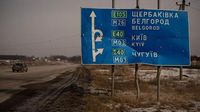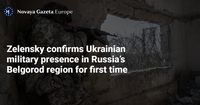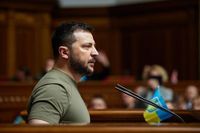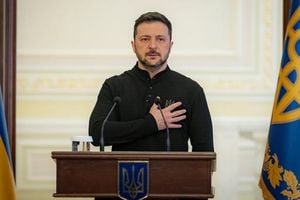Ukrainian President Volodymyr Zelenskyy confirmed for the first time on Monday, April 7, 2025, that Ukrainian troops are active in the Belgorod region of Russia, trying to protect Ukrainian border towns, reports the British broadcaster BBC. In his evening video address, Zelenskyy stated that his top commander, General Oleksandr Syrskyi, had briefed him on the situation at the front, "including our presence in the Kursk and Belgorod regions." He emphasized that Ukraine continues to conduct active operations in border areas on enemy territory, asserting, "the war must go back to where it came from."
Zelenskyy noted that the main objective of these operations is to safeguard Ukraine's border regions of Sumy and Kharkiv while relieving pressure on other parts of the front line, particularly in the eastern Donetsk region. He expressed gratitude to several army units, particularly the 225th storm regiment deployed in Belgorod Oblast, stating, "Well done, guys! I am proud of everyone who fights for Ukraine!"
Russian President Vladimir Putin launched a full-scale invasion of Ukraine in 2022, and Moscow currently controls around 20% of Ukrainian territory. Zelenskyy's comments mark the first explicit confirmation that Ukrainian troops are indeed in Belgorod. Previously, on March 18, he had indirectly acknowledged their presence. Russia had claimed that all attempts by Ukraine to enter the Belgorod region, particularly towards the villages of Demidovka and Prilesye, had been repelled. However, several Russian military bloggers reported fighting in Demidovka, located about two kilometers from the Ukrainian border.
The US-based Institute for the Study of War (ISW) indicated in an update on March 21 that "Ukrainian forces have recently advanced in Belgorod." Their assessment corroborated reports from Russian military bloggers who claimed that Ukrainian forces were consolidating positions on the outskirts of Demidovka and Prilyosje. In the days following, however, conflicting reports suggested that Ukrainian forces were retreating from the Demidovka area.
The Ukrainian operation in Belgorod appears to be smaller than the one conducted in Kursk, where Ukrainian forces briefly occupied several villages. Zelenskyy asserts that these operations are compelling Russia to redeploy troops away from the eastern Donetsk region, where Russian troops have been making steady, albeit slow, advances in recent months. Analysts have raised questions about the military effectiveness of Ukraine's operations on Russian territory, pointing to reports of heavy combat casualties and logistical challenges in supplying weapons.
On Sunday, April 6, 2025, Russian officials announced that their troops had taken the village of Basivka in Ukraine's northeastern Sumy region, which lies opposite Kursk, and were engaged in ongoing fighting with Ukrainian forces in various localities. On April 7, a Ukrainian military spokesman denied that Basivka was under Russian control, highlighting the ongoing confusion and conflict in the region.
This latest incursion into Russia's Belgorod region marks the second such operation since August 2024, when Ukrainian troops crossed the border as part of a broader strategy to respond to ongoing hostilities from Moscow. The president's confirmation of the troops' presence is significant, as it underscores Ukraine's commitment to defending its territory amid escalating tensions.
According to Zelenskyy, the primary goal of these actions is to protect Ukrainian towns and settlements in Sumy and Kharkiv, which have been consistently targeted by Russian forces. Reports suggest that Ukrainian troops have crossed into the Belgorod region as recently as late March 2025, with geolocated footage confirming their advance to the village of Popovka, near the border with Ukraine.
Moscow has acknowledged the situation, claiming that Ukrainian troops are attempting to "wedge" themselves into the western part of the Belgorod region. Russian authorities have also suggested that Kyiv's actions aim to create a negative backdrop in light of ongoing diplomatic discussions between Putin and former US President Donald Trump.
While Ukraine has conducted occasional raids into Belgorod since 2023, these have typically been brief and lacked strategic significance. In contrast, the current operation resembles the larger Kursk incursion from August 2024, where Ukrainian forces temporarily occupied key areas before being pushed back.
As Ukrainian troops withdraw from Kursk, where Moscow has recaptured the logistics hub of Sudzha and regained a significant portion of territory held by Ukraine since the previous year, the focus now shifts to the implications of the Belgorod operation. It remains unclear how many troops are actively engaged in this new front and what strategic importance Kyiv assigns to this incursion.
As the conflict continues to unfold, both sides are preparing for a potential escalation. The situation in Belgorod reflects the ongoing volatility of the war, with each side vying for territorial control and strategic advantage. With the international community closely monitoring developments, the stakes remain high for both Ukraine and Russia.
In summary, the confirmation of Ukrainian troops' presence in Belgorod marks a significant moment in the ongoing conflict, with potential ramifications for both military strategy and diplomatic negotiations. As the situation evolves, it will be crucial to observe how these developments influence the broader dynamics of the war.






